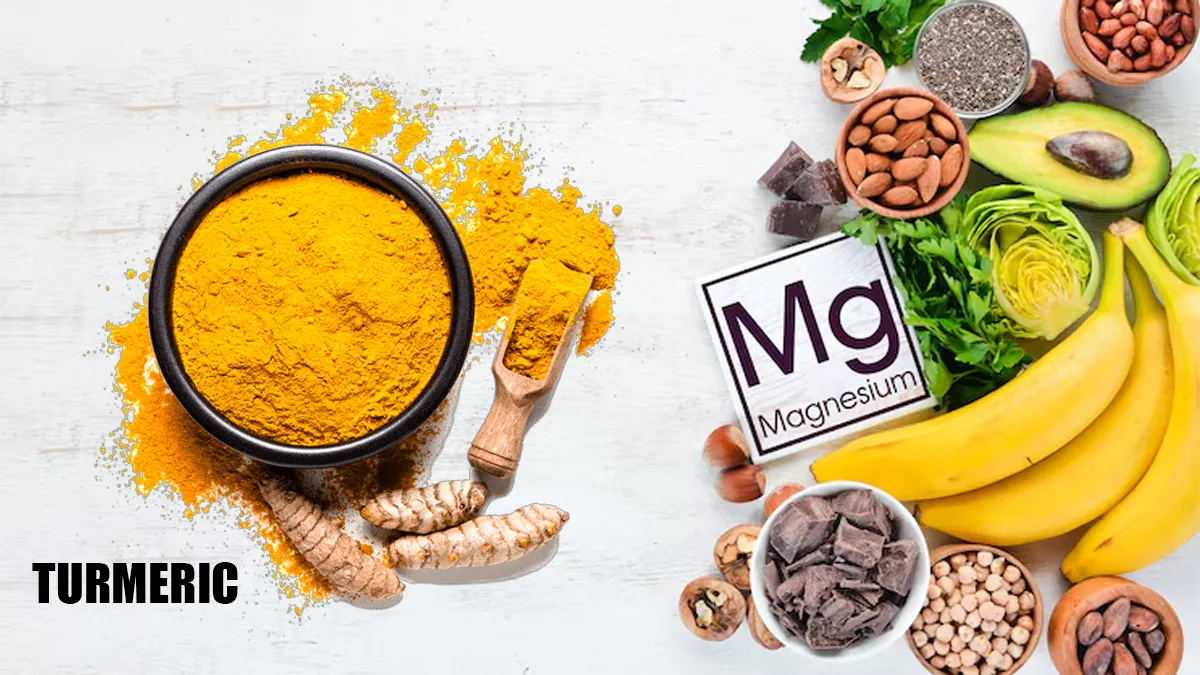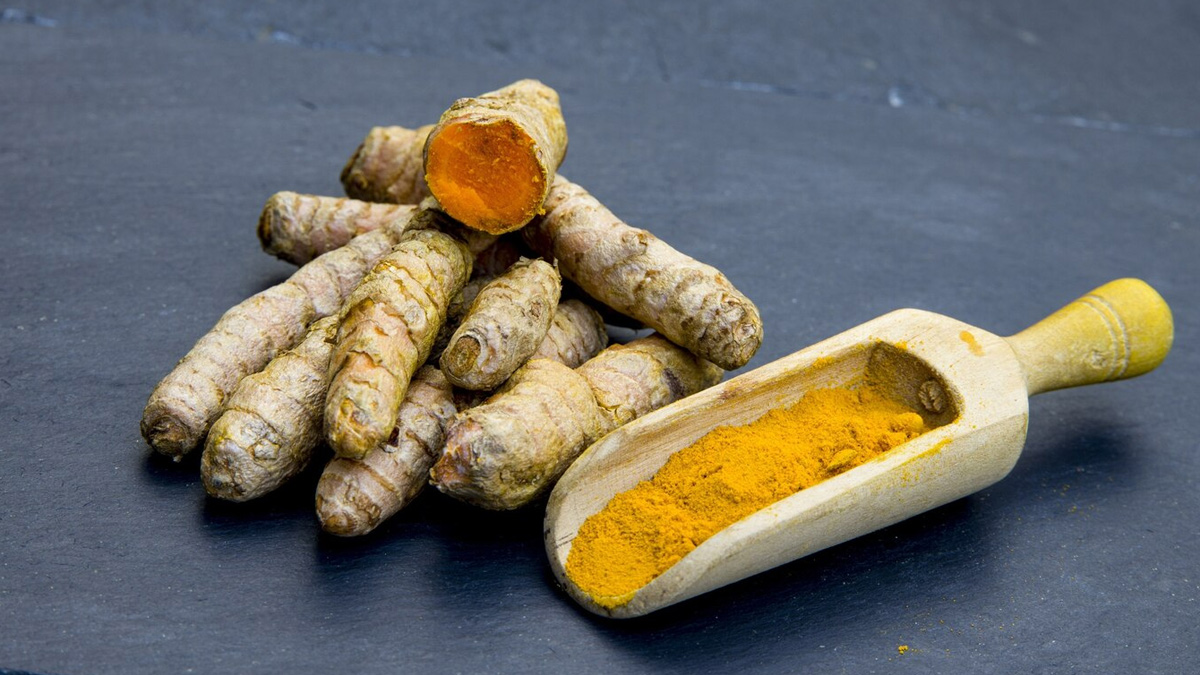
In the nutrition world, food synergy, or the idea that some nutrients function more effectively together, is picking up steam. Among these hopeful combinations are turmeric and magnesium. Both are strong on their own, but taken together, may provide increased health benefits. But what happens when you take them in combination?
Table of Content:-
We spoke to Haripriya N, Nutritionist, Cloudnine Group of Hospitals, Chennai, who explained the benefits of taking turmeric and magnesium together and listed precautionary measures.

"Turmeric, especially its bioactive component curcumin, has been lauded for centuries for its anti-inflammatory, antioxidant, and antimicrobial activities. It's been traditionally used in Ayurveda and traditional Chinese medicine to cure various ailments ranging from joint pain to digestive ailments," said Dr Haripriya.

"Magnesium, on the other hand, plays an important role in more than 300 enzyme reactions within the body. It is involved in muscle and nerve function, blood pressure control, energy production and stress management," added Haripriya.
While each of these nutrients has impressive individual benefits, together they might impact everything, from inflammation to mood and sleep.
Also Read: Expert Shares 20x Benefits of Combining Turmeric and Black Pepper for Enhanced Health Benefits
Benefits of Consuming Turmeric and Magnesium Together
1. Synergistic Anti-inflammatory Effect

"Turmeric (curcumin) and magnesium are natural anti-inflammatory substances. Curcumin blocks inflammation pathways, such as NF-kB, whereas magnesium controls the inflammatory response of the body by dampening markers like CRP (C-reactive protein)," said Haripriya.
Taking them together may offer a dual defence against chronic inflammation, and potentially supporting conditions, such as arthritis, muscle soreness, and inflammatory bowel diseases.
2. Enhanced Mood and Mental Health Support
Chronic stress, anxiety, and depression are often linked to low magnesium levels. Magnesium enhances brain function and stabilises neurotransmitters, such as serotonin and GABA.
Curcumin also has been found to alleviate depression symptoms by boosting Brain-Derived Neurotrophic Factor (BDNF) levels and reducing oxidative stress.
Together, they may provide natural support for mood disorders, offering an alternative to the use of drugs for those afflicted with anxiety, mild depression, or chronic stress.
3. Sleep Quality and Relaxation

Magnesium is popularly known for inducing relaxation and sleep. It regulates the release of melatonin and helps relax muscles, which results in better sleep. Curcumin, alternatively, may indirectly help one sleep through the reduction of inflammation, pain regulation, and stress, all of which cause disturbances in sound sleep.
Together, they may enable better, sounder sleep in individuals with insomnia due to stress or body aches.
Also Read: Magnesium For Sleep: When And How to Take It For Best Results
4. Antioxidant Boost and Cellular Protection
"Curcumin is a highly effective antioxidant which traps free radicals and enhances the antioxidant enzymes of the body, such as glutathione. Magnesium too plays a role in antioxidant defense mechanisms," added Haripriya.
The combination of both can enhance cellular defence against oxidative stress, an agent of ageing, cardiovascular diseases, and neurodegeneration.
5. Gut Health and Digestive Benefits
- Turmeric is commonly used to manage bloating, indigestion, and gut inflammation.
- Magnesium, especially in the form of citrate or oxide, may aid bowel movement and reduce constipation.
For those with sluggish digestion or Irritable Bowel Syndrome (IBS), this combination can be helpful by maintaining gut motility and reducing inflammation within the GI tract.
Precautions and Who Should Avoid This Combo

- People on blood thinners or anti-diabetic drugs should consult a medical professional before using turmeric supplements.
- High amounts of magnesium, particularly in supplement form, may cause diarrhoea, low blood pressure, or arrhythmias.
- Pregnant and lactating women should use this combination only under professional advice.
- Always select high-quality, bioavailable types, such as curcumin with black pepper (piperine) and magnesium glycinate or citrate.
The best dosage and form of turmeric and magnesium will depend on the individual's health needs and requirements. "It is generally safe to take turmeric (curcumin) in doses between 500 and 1,500 milligrams (mg) per day. Recommended Dietary allowance (RDA) for magnesium in adults ranges from 310-400 mg per day. Always consult the Registered dietitian before taking any over-the-counter Nutrition supplements," shared Haripriya.
A great dietary combination for turmeric and magnesium is milk with turmeric and pepper. Milk is a good source of magnesium, and when turmeric and pepper are added, the bioavailability of curcumin, a powerful antioxidant, is enhanced.
Bottomline
Haripriya concluded, "Turmeric and magnesium are a dynamic duo with overlapping and complementary benefits. When taken thoughtfully, they could lower inflammation, enhance mood, improve sleep, promote a healthy gut, and shield cells against oxidative damage."
As always, consult a medical professional before starting any supplement, and look for a whole-food-first alternative whenever possible. In nutrition, it's not merely what you eat, but how nutrients collaborate. And in this case, turmeric and magnesium might be a powerful partnership worth exploring.
[Disclaimer: This article contains information provided by an expert and is for informational purposes only. Hence, we advise you to consult your professional if you are dealing with any health issue to avoid complications.]
Also watch this video
How we keep this article up to date:
We work with experts and keep a close eye on the latest in health and wellness. Whenever there is a new research or helpful information, we update our articles with accurate and useful advice.
Current Version